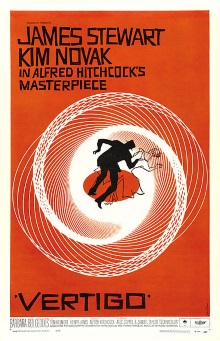
Vertigo is the first Alfred Hitchcock film to be covered in this blog since I’ve started seriously writing about movies. In general, I’ve watched embarrassingly few of his films. Like everyone else, I’ve watched Psycho ages ago but don’t have a clear memory of it. I’ve also watched The Birds a few years back and that’s it. That means I have a lot of catching up to do.
Starting with this film seems like a good bet. Despite being poorly reviewed at the time of its release, it is in the select group of films that are often considered the greatest of all time. It’s also a great choice because it’s an archetypally Hitchcockian mystery, complete with a glamorous female lead and the signature twist ending. It is in this film that Hitchcock debuted what is known as the dolly zoom to induce a sensation of vertigo in the audience.
Beginning right from the opening scene of a rooftop chase at night, the legendary director demonstrates his mastery of suspense and the power to shock and surprise. James Stewart plays Scottie, a newly retired police detective who is hired by a college friend to follow his wife. Played by Kim Novak, the wife Madeleine is said to have started behaving strangely due to being possessed by a ghost. Scottie is skeptical but takes the job anyway and soon starts discovering worrying clues that the tale might well be true.
The premise is somewhat clichéd but Hitchcock’s mastery of pacing and the ability to intuitively know what the audience’s expectations are and subvert them makes this a riveting experience. Scottie and Madeleine may look like the stereo-typically perfect Hollywood couple but both are deeply flawed and weak characters, which is as always what makes them so interesting. I’m ordinarily leery of stories that are focused around a single gimmick like acrophobia, but this film not only successfully conveys the sense of how terrifying it is, it integrates it perfectly into the story.
It also works because its themes are so rich and so powerful. Much more so than the simple fear of heights, this film is about obsession, as expressed in many different ways. The obvious one of course is how Scottie becomes obsessed with Madeleine after getting to know her but to reinforce that theme the film also keeps returning to the same places, objects and situations over and over again. A great example of this is when Scotties trails her in her car and she seems to keep driving in circles around the same block. That sensation of spiralling and circling around the same things is of course just another form of vertigo. Not very subtle perhaps, but it’s hard to deny the dramatic and emotional power of this effect.
The one awkward moment I felt was during the letter-writing scene where Hitchcock felt that he had to explicitly explain the plot to the audience about two-thirds of the way through the movie. It might have been necessary to convey to the audience the frame of mind of the female lead, but it does rob the climax of some of its power and it’s just a clumsy scene. My wife thinks that Hitchcock could have gotten away with heavy hints of the truth and revealed everything only at the very end.
Anyway I’m keeping this short because I’m such an amateur at this that going on about this at length would just be embarrassing. Suffice to say that it truly is a great film, all the while being approachable and entertaining to just about everyone. I really need to watch more Hitchcock.
One thought on “Vertigo (1958)”